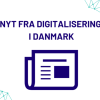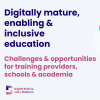Technology Understanding as Mandatory Father:
Magnus Herrman argues that technology understanding should be mandatory in primary and lower secondary school. He points out that it should not be an electoral profession, otherwise it can create a divide between those who already have a technological interest and those who do not. The aim is to provide all pupils with equal access to digital skills.
“It should not be just a profession of choice that charges those who already have an interest in technology. Technology understanding must be for everyone, not just for the few. So we think it is very important, for example, that it is a compulsory subject for a few years and then can become an electoral profession in the older classes.”
Future Skills and Competences:
The interview focuses on what skills and competences students can acquire through mandatory technology understanding. Magnus Herrman points out that many pupils leave primary and lower secondary school without sufficient digital skills, which in the worst case may hamper them in a digitalised workplace. He stresses the need for teaching to respond to the needs of both general and individual pupils and expresses concern that technology understanding as an elective profession can create inequality and stresses the need to make it mandatory.
“We also wonder how to think that everyone will be able to acquire digital skills here when it’s a profession of election. So, we clearly believe that it must be mandatory.”
Teacher and continuing education:
Mr Herrman also discusses the challenges of technology understanding teaching, where many teachers lack competences and further training in the field. He argues that teachers should be given further training and technology understanding should be incorporated into teacher training to ensure that teachers have the necessary tools to communicate the substance effectively.
Use of IT tools:
iPads, laptops and tools such as Google Docs are an integral part of the daily life of primary school pupils. The use of these tools is not a problem for students, especially with the introduction of generative AI known to students, but, according to Magnus Herrman, does not actively use in teaching. On the other hand, he indicates that what is needed is the background of what is being done using the IT tools.
“I don’t think this is because we need to use our digital tools more. I believe we need to learn how to use them in a better and more constructive way. Then learn to get more out of it and how to make real use of the digital tools you have. There is a general tendency to see a lack of preparation for all the media you use, where you really know what you are doing when using all the apps and how to use different IT tools.”
Appeal to Digital Dformation:
In conclusion, Magnus Herrman calls for digital education to be integrated into education: “Itmust be both technology understanding but also the use of technology, it seems to be the most important, but we think that there is a lot of discussion here with technology and how to use it, but not so much it here, with an understanding of what it really is and how it can affect our daily lives.”
Danish school pupils argue for a more comprehensive approach to technology understanding in primary and lower secondary schools, where teaching becomes mandatory and teachers receive the necessary training. This ensures that all students acquire the digital competences they need and provide more equal access to technology understanding.
As a primary school pupil from Hvidovre, Magnus Herrman’s perspective provides valuable insight into the need to strengthen technology understanding in primary and lower secondary school. In addition to being Vice-President in the surroundings of Copenhagen, he is also part of the board of directors of Danish school pupils and his appeal to make the profession mandatory and invest in teacher training points to necessary steps to equip students for a digital future. At the same time, he stresses the importance of integrating digital creation and preparing students for the practical application of technology in their daily lives.






